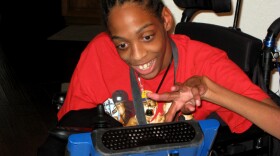Charter schools turn 21 this year. In that time, these privately run, publicly funded schools have spread to 41 states and enrolled more than 2 million students.
But one key question lingers: Do kids in charter schools learn more than kids in traditional public schools?
There have been lots of skirmishes over charter school data over the years. But few have created as big a ruckus as the 26-state study of charter schools released recently by Stanford University's Center for Research on Education Outcomes, or CREDO.
Like previous studies, the one from CREDO concluded that kids in most charter schools are doing worse or no better than students in traditional public schools. About a third, though, are doing better. And that's a big jump from four years ago. The gains among blacks, Latinos and kids whose first language is not English have been impressive and surprising, says CREDO Director Margaret Raymond.
"The fact that we can show that significantly disadvantaged groups of students are doing substantially better in charter school in reading and math, that's very exciting," she says.
More and more charter school students are doing better, Raymond says, because they're getting anywhere from three to 10 extra weeks of instruction compared to their public school counterparts.
"The average charter school student in the United States is benefiting from additional days of learning," she says, "compared to where they were four years ago and compared to traditional public schools they otherwise would've attended.
None of these findings were in dispute. But when Jeanne Allen looked at the study, it upset her.
"The way that CREDO has manipulated data and made conclusions about policy based on that data is absolutely 'un-credible,' " she says.
Allen heads the Center for Education Reform. She loves charter schools and would do anything to support them — short of endorsing a study that she says makes bogus comparisons between charter school kids and regular public school kids
"They compared those students to students that don't even exist," Allen says.
In other words, she says, the CREDO study did not compare real kids to real kids. Instead, researchers took selected data and created a "composite" student to represent public school kids.
But, Raymond says that's a perfectly legitimate and not uncommon way to survey similar kids in different schools and compare how much they're learning.
"Something we call the 'virtual twin,' " she says.
Raymond stands by her findings.
"We have a very long, and we hope untarnished, history and reputation as playing it just right down the middle," she says. "We let the data speak based on evidence, not rhetoric."
It's one thing for opponents of charter schools to question a big study that has anything good to say about charter schools. It's another for an influential, respected champion of charter schools like Jeannie Allen to do so. And that irritates some charter school leaders, like Nina Rees, the head of the National Alliance for Public Charter Schools.
"Is it a perfect study? No," Rees says. "But I would not discount the CREDO study as a bad study."
"What's interesting about the CREDO study more than anything else are the findings for African-American students in poverty," she adds, "for Hispanic students and for English-language learners..
But, a study's findings first have to be credible, argues Allen.
"We absolutely can measure students — individual student achievement — over time," she says.
But it takes a lot of patience and money that too many studies have been unable or unwilling to spend to get to that crucial question: Are charter school students learning more than kids in traditional public schools?
This fall, 21 years after the first charter school opened, the National Alliance for Public Charter Schools and Harvard University will for the first time bring top researchers to Washington to try to answer that question.
Copyright 2020 NPR. To see more, visit https://www.npr.org. 9(MDAxNDQ2NDAxMDEyNzU2NzM2ODA3ZGI1ZA001))







